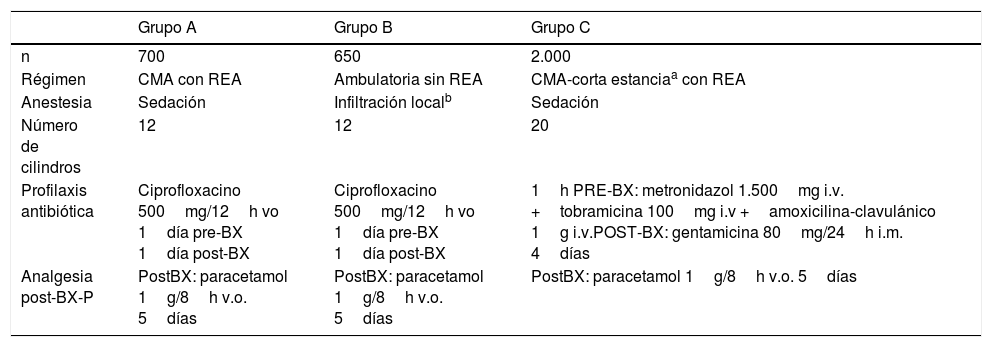El cáncer de próstata es la neoplasia visceral más frecuente en el varón, y en Estados Unidos es la segunda con mayor mortalidad, por detrás del cáncer de pulmón y por delante del cáncer colorrectal. La mortalidad por cáncer prostático se ha reducido en Estados Unidos, Austria, Reino Unido y Francia, mientras que la supervivencia a los 5 años ha aumentado en Suecia, debido probablemente al incremento de la actividad diagnóstica y a una mayor detección de tumores no mortales. La biopsia transrectal de próstata (BTRP) suele tener una baja tasa de complicaciones graves, con un número de complicaciones menores no despreciable. La mortalidad asociada directamente a este procedimiento es baja y suele estar en el contexto de un shock séptico. Las principales complicaciones derivadas de la biopsia de próstata pueden ser infecciosas (leves o graves) y no infecciosas (hemorragia en forma de hematuria, uretrorragia, rectorragia o hemospermia, retención aguda de orina [RAO], dolor o reacciones vagales).
Material y métodoEl objetivo del estudio es comparar tres protocolos habituales de BTRP y su relación con la aparición de complicaciones. Estudio retrospectivo multicéntrico observacional realizado en tres países (España, Italia y Portugal). Se revisaron los historiales clínicos de 3.350 varones a los que se ha realizó una BTRP para investigar la existencia de cáncer de próstata, con un control evolutivo mínimo de 6meses.
ResultadosLa edad media fue de 65,50años, mediana 66, rango 43-79. En el análisis de subgrupos se apreció que en los pacientes más jóvenes hubo más RAO (p=0,0000001). Así mismo, nuestros resultados arrojaron que los pacientes más jóvenes presentaron más dolor relacionado con el procedimiento (p=0,0000001) que los de mayor edad. En cuanto al PSA, la media fue de 10,44, DE 7,73, mediana 8,15, rango 0,98-68,09. El índice de masa corporal (IMC) más elevado no se asoció a más infección (p=0,000004). Al realizar el análisis multivariante se comprobó que las variables significativas en el grupo general fueron: edad (p=0,0013), PSA (p=0,0402), anestesia con infiltración local (p=0,0001) y profilaxis con esquema metronidazol +tobramicina +amoxicilina-ácido clavulánico +gentamicina (p=0,0001), presentando una distribución normal con alto intervalo de confianza (95%) y correlación significativa. La variable más significativa para ninguna complicación y para el dolor es la profilaxis (p=0,0001), para el sangrado son la edad (p=0,0013) y la profilaxis (p=0,0001), para la infección son la edad (p=0,0013), la profilaxis y el PSA (p=0,0001), y para la RAO son la edad (p=0,0013), la anestesia con infiltración local, la profilaxis (p=0,0001) y el PSA (p=0,0402).
ConclusionesLa aplicación de sedación general tiene menos efectos secundarios y complicaciones relacionadas con el procedimiento de la biopsia transrectal de próstata respecto a la aplicación de anestesia local transrectal. La elección del tipo de pauta de profilaxis antibiótica resulta determinante en la aparición de complicaciones derivadas de la realización de la biopsia transrectal de próstata.
Prostate cancer is the most common visceral neoplasm in men and the second one in the United States with the highest mortality behind lung cancer and ahead of colorectal cancer. While prostate cancer mortality rates have been reduced in the United States, Austria, United Kingdom and France, 5-year survival rates have been incremented in Sweden, probably due to a higher diagnostic activity and non-lethal tumor detection. TRPB usually has low rates of serious complications, with a not negligible number of minor complications. Mortality directly associated with this procedure is low and usually related to septic shock. The main complications derived from prostate biopsy can be infectious (mild or severe) and non-infectious (hematuria consistent with hemorrhage, urethral bleeding, rectal bleeding or hemospermia, acute urinary retention, pain or vasovagal reactions).
Material and methodThe objective of the study is to compare three usual TRPB protocols and their relationship with the incidence of complications. Retrospective multicenter observational study conducted in three countries (Spain, Italy and Portugal). We have reviewed the medical records of 3350 men who underwent TRPB to evaluate the existence of prostate cancer, with a minimum evolutionary control of 6months.
ResultsThe mean age was 65,50years, median 66, range 43-79. The subgroup analysis showed that younger patients had higher rates of acute urine retention (AUR) (P=.0000001). Likewise, our results revealed that younger patients presented more procedural pain (P=.0000001) than older patients. Regarding PSA, the mean value was 10.44, SD 7.73, median 8.15, range 0.98-68.09. A higher body mass index (BMI) was not associated with further infection (P=.000004). When performing the multivariate analysis, it was found that the significant variables in the general group were: age (P=.0013), PSA (P=.0402), local infiltration anesthesia (P=.0001) and prophylaxis with metronidazole +tobramycin +amoxicillin/clavulanic acid +gentamicin (P=.0001), presenting a normal distribution with high confidence interval (95%) and significant correlation. Prophylaxis is the most significant variable for no complications and pain (P=.0001), age (P=.0013) and prophylaxis (P=.0001) are for bleeding, age (P=.0013), prophylaxis and PSA (P=.0001) are for infection, and finally, age (P=.0013), anesthesia with local infiltration and prophylaxis (P=.0001) and PSA (P=.0402) are for AUR.
ConclusionsSedation has fewer side effects and complications related to the transrectal prostate biopsy procedure with respect to transrectal local anesthesia. The choice of the antibiotic prophylaxis scheme is decisive in the onset of complications arising from the performance of a transrectal prostate biopsy.

















